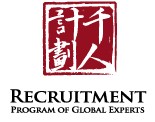Home
Workshop Photo

Workshop on Quantum Metrology, Interaction, and Causal Structure
December 9-13, 2013, Room 1-315, FIT Building, Tsinghua University, Beijing, China
The Workshop
Quantum Information Theory is one of the most fascinating areas of contemporary physics, offering a privileged angle on the foundations of quantum mechanics and, at the same time, holding the promise of a new information technology. The aim of this workshop is to bring together researchers who share a common interest in fundamental aspects of quantum information, and, specifically, in the ultimate limits for the extraction of information and in the interface between optimal information processing and causal structure.
The workshop aims at generating new collaborations and at promoting the exchange of ideas across different areas of quantum information, favouring the participation of researchers with different backgrounds across physics (both theoretical and experimental) and computer science.
Supported by








Program
December 9-13 2013, Room 1-315, FIT Building, Institute for Interdisciplinary Information Sciences, Tsinghua University.
Monday, December 9.
9:30-11:30 Registration of invited speakers at the third floor of FIT Building, lobby space in front of room 1-315.
14:00-14:10 Opening welcome by Prof. Andrew C.-C. Yao, Dean of IIIS, Tsinghua University
14:10-15:10 Emilio Bagan (Universitat Autonòma Barcelona), Probabilistic quantum metrology.
15:10-15:30 Break
15:30-16:30 Giulio Chiribella (IIIS, Tsinghua University), Quantum replication at the Heisenberg limit.
16:30-17:30 Ho Tsang Ng (IIIS, Tsinghua University), Quantum-limited measurement of magnetic-field gradient using entangled atoms.
Tuesday, December 10
9:00-10:00 Marco Genovese (National Institute of Metrological Research, Torino),
Time from quantum entanglement.
10:00-10:20 Break
10:20-11:20 Heng Fan (Institute of Physics, CAS),
Remote clock synchronization and multiple phase estimation in quantum metrology.
11:20-12:20 Kihwan Kim (IIIS, Tsinghua University),
State-independent experimental tests of quantum contextuality in a three dimensional system.
12:20-14:00 Lunch Break
14:00-15:00 Bob Coecke (University of Oxford),
Picturing quantum processes.
15:00-15:20 Break
15:20-16:20 Francesco Buscemi (University of Nagoya),
The quantum Blackwell theorem.
16:20-17:30 Open discussions.
Wednesday, December 11
9:00-10:00 Ramon Muñoz-Tapia (Universitat Autònoma Barcelona),
Quantum state discrimination with abstention.
10:00-10:20 Break
10:20-11:20 Shunlong Luo (Academy of Mathematics and Systems Science, CAS),
Fisher information.
11:20-12:20 Yuan Feng (University Technology Sydney),
Model checking quantum Markov chains.
12:20-14:00 Lunch break
14:00-15:00 Masahito Hayashi (University of Nagoya),
Fourier analytic approach to quantum estimation of group action.
15:00-15:20 Break
15:20-16:20 Runyao Duan (University of Technology Sydney),
Zero-error classical capacity and simulation cost of a channel assisted by quantum non-signalling correlations.
16:20-17:30 Open discussion
18:00 Workshop dinner (at Quanjude Restaurant) for invited speakers. (First Floor, Building A, S.P Tower, Tsinghua Science Park).
Thursday, December 12
9:30-10:30 Mio Murao (University of Tokyo),
Causal order manipulation in adiabatic and measurement-based quantum computation.
10:30-10:50 Break
10:50-11:50 Ognyan Oreshkov (Université Libre de Bruxelles),
Quantum mechanics as a time-symmetric operational probabilistic theory.
11:50-12:00 Group Photo
12:00-14:00 Lunch break
14:00-15:00 Luming Duan (University of Michigan and IIIS, Tsinghua University),
Time crystals and non-equilibrium dynamics with trapped ions.
15:00-15:20 Break
15:20-16:20 Marco Bellini (National Institute of Optics, Firenze),
Experimental operator sequences and superpositions for noiseless amplification and hybrid entanglement.
16:20-17:20 Carlo Ottaviani (University of York),
Two-way quantum cryptography with continuous variables: unconditional security and performances at different wavelengths.
Friday, December 13
09:30-10:30 Pablo Arrighi (Université Joseph Fourier, Grenoble),
Quantum walks for relativistic particles.
10:30-10:50 Break
10:50-11:50 Alioscia Hamma (IIIS, Tsinghua University),
A toy model for quantum space time.
11:50-14:00 Lunch break
14:00-15:00 Daniel Burgarth (Abeystith University),
Control of open quantum systems: case study of the central spin model.
15:00-16:00 Masaki Owari (NTT Communication Science Laboratories, Tokyo),
Probing an untouchable quantum environment as a resource for quantum computing.
16:00-16:10 Concluding remarks
16:10-17:30 Open discussions.



Invited Speakers
List of speakers:
Pablo Arrighi (Université Joseph Fourier, Grenoble)
Emili Bagan (Universitat Autònoma Barcelona)
Marco Bellini (National Institute of Optics, Florence)
Daniel Burgarth(Abeystith University)
Francesco Buscemi (University of Nagoya)
Giulio Chiribella (IIIS, Tsinghua University)
Bob Coecke (University of Oxford)
Luming Duan (University of Michigan)
Runyao Duan (UTS Sydney)
Heng Fan (Institute of Physics, CAS)
Yuan Feng (UTS Sydney)
Marco Genovese (National Institute of Metrological Research, Turin)
Masahito Hayashi (University of Nagoya)
Alioscia Hamma (IIIS, Tsinghua University)
Kihwan Kim (IIIS, Tsinghua University)
Ramon Muñoz-Tapia (Universitát Autonoma Barcelona)
Mio Murao (University of Tokyo)
Ho Tsang Ng (IIIS, Tsinghua University)
Shunlong Luo (Academy of Mathematics and System Sciences, CAS)
Ognyan Oreshkov (Université Libre de Bruxelles)
Carlo Ottaviani (University of York)
Masaki Owari (NTT, Tokyo)



Location
Location
Workshop on Quantum Metrology, Interaction, and Causal Structure will take place at Room 1-315, FIT Building, Tsinghua University, Beijing, China.
Future Internet Technology Research Center (FIT building) occupies an area of 30,000 sq. m. and is equipped with high-tech facilities necessary for successful completion of the conference. It also enjoys a favorable location, besides the main gate of Tsinghua University.
Tsinghua University is one of the top universities in China, enjoying a history of 100 years and endowed with a strong engineering tradition. The campus of Tsinghua University is situated on several former royal gardens of the Qing Dynasty, surrounded by a few historical sites in northwest Beijing. The garden-like landscape, with the Wanquan River meandering through, has inspired and motivated generations of students.
Having been the capital of China for over 800 years, Beijing is a city with rich cultural heritage and has retained lots of the color of traditional Chinese life. At the same time, it is also booming modern metropolis, and much of this can be seem amid its new construction. Beijing has many places of historical interest and scenic beauty, such as the Great Wall, the Forbidden City, the Summer Palace etc.
Accommodation
(Wenjin International Hotel)
Address: Tsinghua Science Park, Haidian District, Beijing, China
Tel: +8610 62525566
View Larger Map
If you cannot see the google map, you might find this useful.
You may take a taxi to Wenjin Hotel. It costs 13 Yuan (2 USD) for the first three kilometers and other 2.3 Yuan (0.3 USD) per kilometer thereafter. An additional fuel fee of 1 Yuan will be charged. Please show the following Chinese note to the driver if you take a taxi to Wenjin Hotel .





